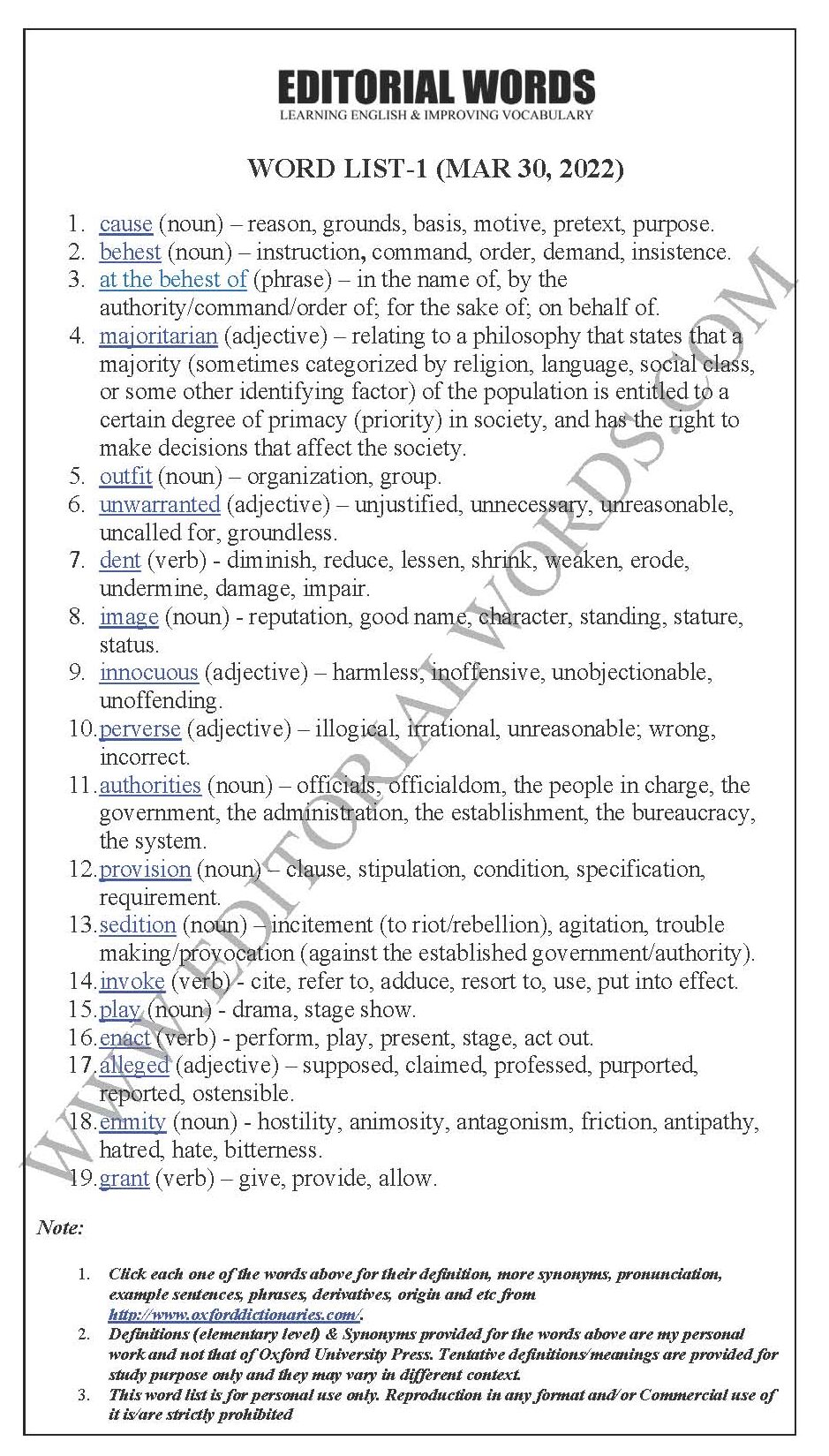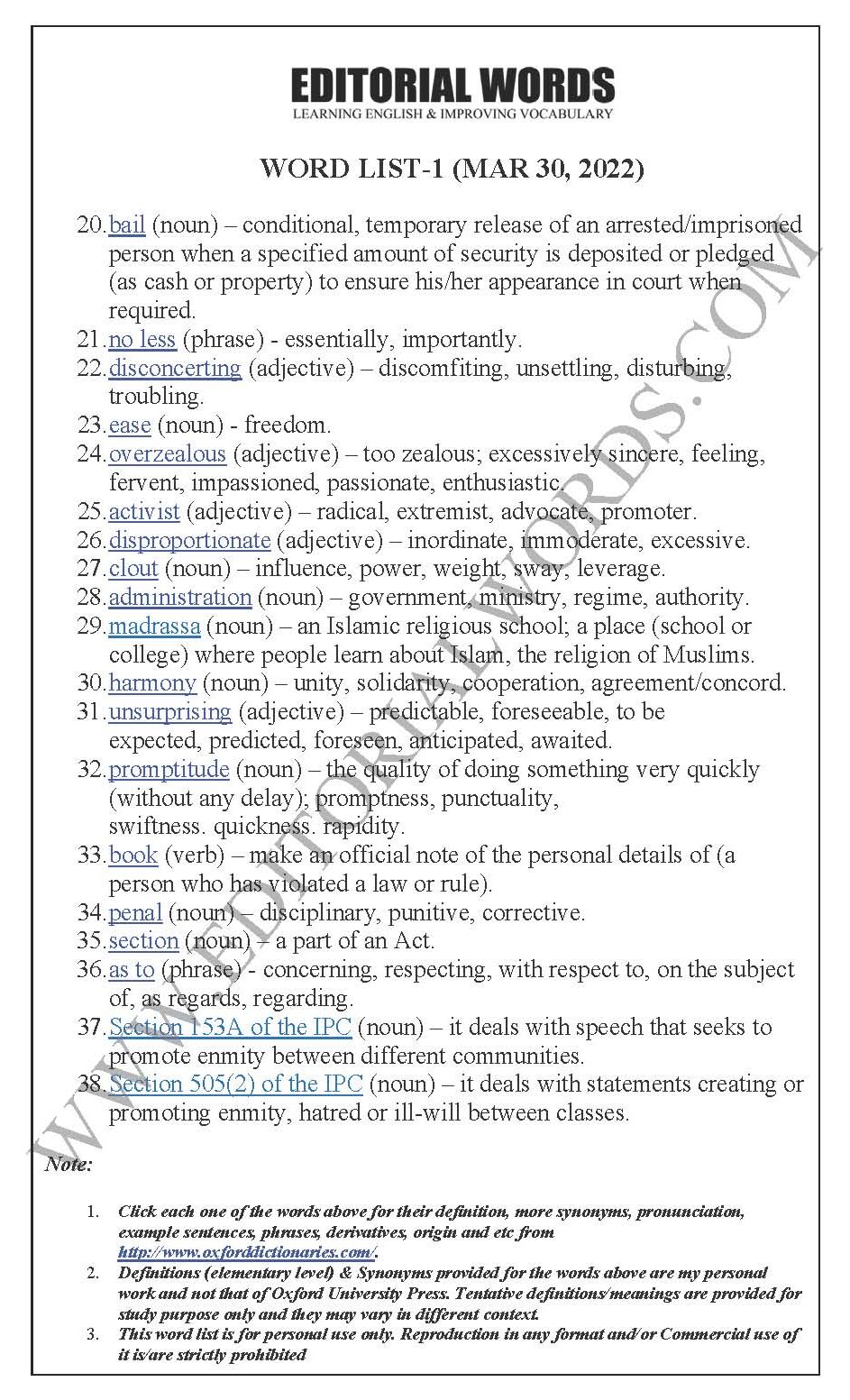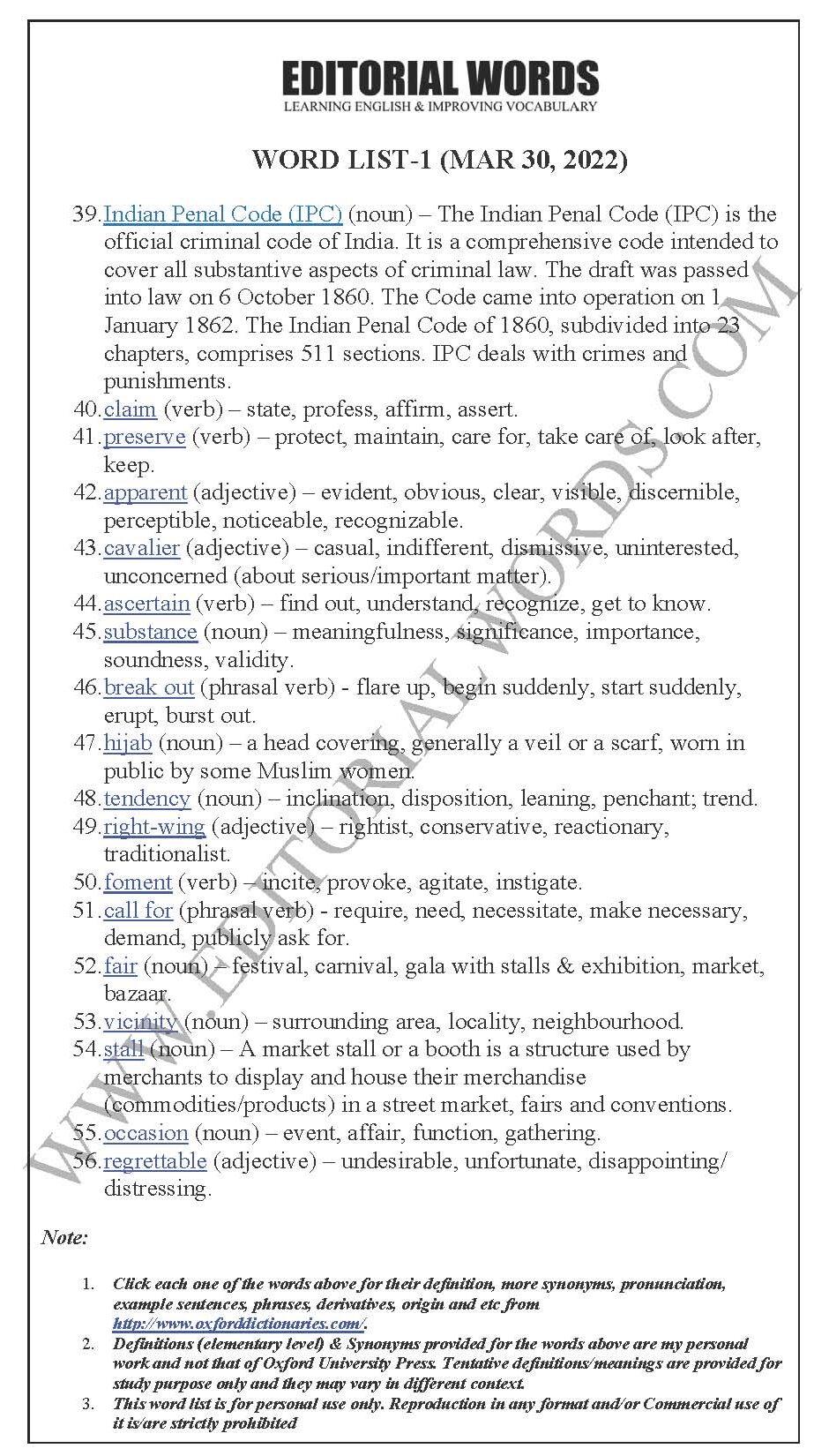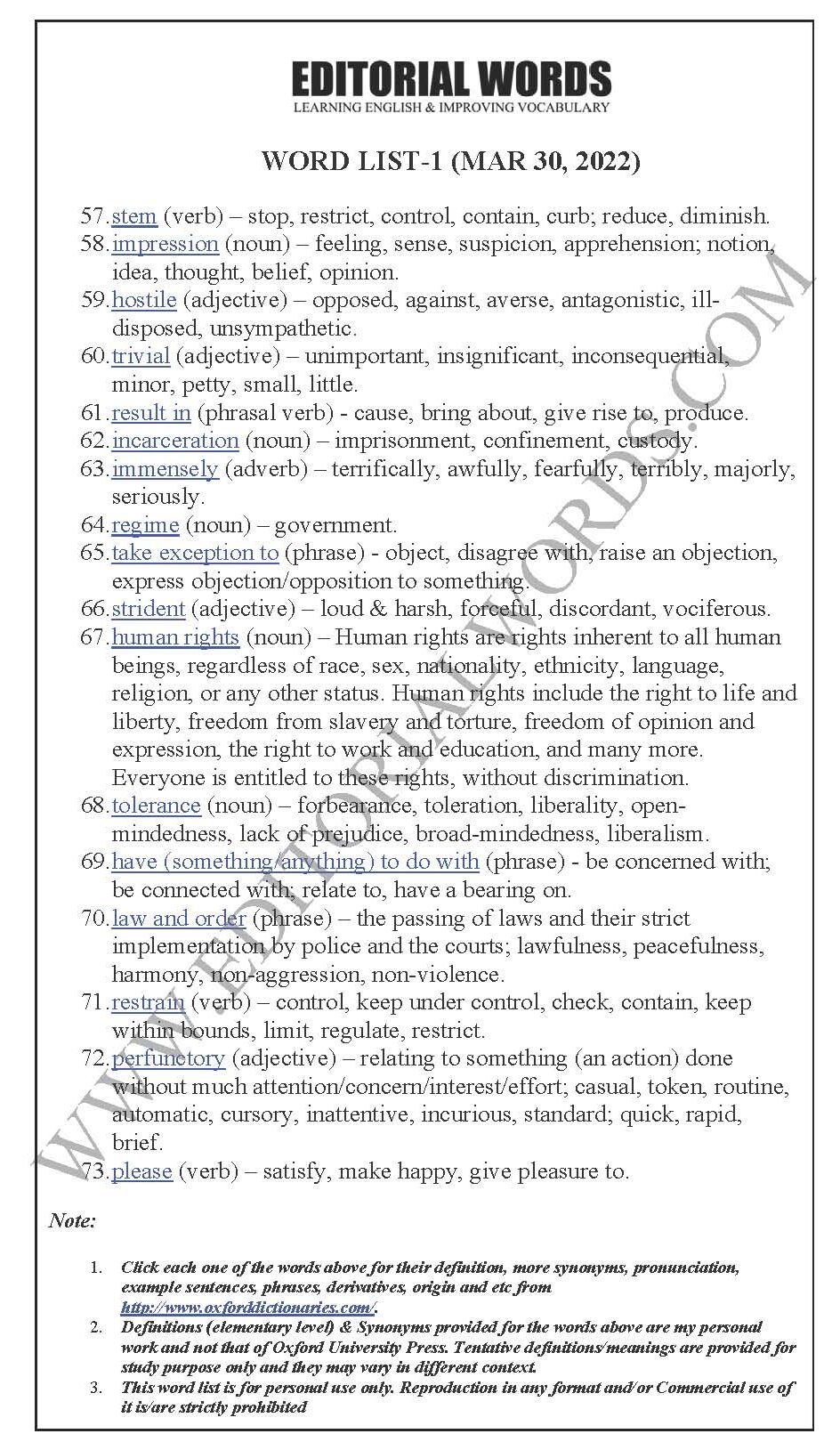The Hindu Editorial (Without sufficient cause) – Mar 30, 2022
The recent arrest of a 25-year-old Muslim woman at Mudhol in Bagalkot district of Karnataka for an innocuous message on Pakistan’s Republic Day is yet another instance of the perverse misuse of the law by authorities… For further reading, visit “The Hindu”. Below is today’s word list-1 for The Hindu Editorial (Without sufficient cause) – Mar 30, 2022.
To read this article, click “The Hindu”.
This preview is provided here with permission.
Courtesy: The Hindu
The Hindu Editorial (Without sufficient cause) – Mar 30, 2022:
- cause (noun) – reason, grounds, basis, motive, pretext, purpose.
- behest (noun) – instruction, command, order, demand, insistence.
- at the behest of (phrase) – in the name of, by the authority/command/order of; for the sake of; on behalf of.
- majoritarian (adjective) – relating to a philosophy that states that a majority (sometimes categorized by religion, language, social class, or some other identifying factor) of the population is entitled to a certain degree of primacy (priority) in society, and has the right to make decisions that affect the society.
- outfit (noun) – organization, group.
- unwarranted (adjective) – unjustified, unnecessary, unreasonable, uncalled for, groundless.
- dent (verb) – diminish, reduce, lessen, shrink, weaken, erode, undermine, damage, impair.
- image (noun) – reputation, good name, character, standing, stature, status.
- innocuous (adjective) – harmless, inoffensive, unobjectionable, unoffending.
- perverse (adjective) – illogical, irrational, unreasonable; wrong, incorrect.
- authorities (noun) – officials, officialdom, the people in charge, the government, the administration, the establishment, the bureaucracy, the system.
- provision (noun) – clause, stipulation, condition, specification, requirement.
- sedition (noun) – incitement (to riot/rebellion), agitation, trouble making/provocation (against the established government/authority).
- invoke (verb) – cite, refer to, adduce, resort to, use, put into effect.
- play (noun) – drama, stage show.
- enact (verb) – perform, play, present, stage, act out.
- alleged (adjective) – supposed, claimed, professed, purported, reported, ostensible.
- enmity (noun) – hostility, animosity, antagonism, friction, antipathy, hatred, hate, bitterness.
- grant (verb) – give, provide, allow.
- bail (noun) – conditional, temporary release of an arrested/imprisoned person when a specified amount of security is deposited or pledged (as cash or property) to ensure his/her appearance in court when required.
- no less (phrase) – essentially, importantly.
- disconcerting (adjective) – discomfiting, unsettling, disturbing, troubling.
- ease (noun) – freedom.
- overzealous (adjective) – too zealous; excessively sincere, feeling, fervent, impassioned, passionate, enthusiastic.
- activist (adjective) – radical, extremist, advocate, promoter.
- disproportionate (adjective) – inordinate, immoderate, excessive.
- clout (noun) – influence, power, weight, sway, leverage.
- administration (noun) – government, ministry, regime, authority.
- madrassa (noun) – an Islamic religious school; a place (school or college) where people learn about Islam, the religion of Muslims.
- harmony (noun) – unity, solidarity, cooperation, agreement/concord.
- unsurprising (adjective) – predictable, foreseeable, to be expected, predicted, foreseen, anticipated, awaited.
- promptitude (noun) – the quality of doing something very quickly (without any delay); promptness, punctuality, swiftness. quickness. rapidity.
- book (verb) – make an official note of the personal details of (a person who has violated a law or rule).
- penal (noun) – disciplinary, punitive, corrective.
- section (noun) – a part of an Act.
- as to (phrase) – concerning, respecting, with respect to, on the subject of, as regards, regarding.
- Section 153A of the IPC (noun) – it deals with speech that seeks to promote enmity between different communities.
- Section 505(2) of the IPC (noun) – it deals with statements creating or promoting enmity, hatred or ill-will between classes.
- Indian Penal Code (IPC) (noun) – The Indian Penal Code (IPC) is the official criminal code of India. It is a comprehensive code intended to cover all substantive aspects of criminal law. The draft was passed into law on 6 October 1860. The Code came into operation on 1 January 1862. The Indian Penal Code of 1860, subdivided into 23 chapters, comprises 511 sections. IPC deals with crimes and punishments.
- claim (verb) – state, profess, affirm, assert.
- preserve (verb) – protect, maintain, care for, take care of, look after, keep.
- apparent (adjective) – evident, obvious, clear, visible, discernible, perceptible, noticeable, recognizable.
- cavalier (adjective) – casual, indifferent, dismissive, uninterested, unconcerned (about serious/important matter).
- ascertain (verb) – find out, understand, recognize, get to know.
- substance (noun) – meaningfulness, significance, importance, soundness, validity.
- break out (phrasal verb) – flare up, begin suddenly, start suddenly, erupt, burst out.
- hijab (noun) – a head covering, generally a veil or a scarf, worn in public by some Muslim women.
- tendency (noun) – inclination, disposition, leaning, penchant; trend.
- right-wing (adjective) – rightist, conservative, reactionary, traditionalist.
- foment (verb) – incite, provoke, agitate, instigate.
- call for (phrasal verb) – require, need, necessitate, make necessary, demand, publicly ask for.
- fair (noun) – festival, carnival, gala with stalls & exhibition, market, bazaar.
- vicinity (noun) – surrounding area, locality, neighbourhood.
- stall (noun) – A market stall or a booth is a structure used by merchants to display and house their merchandise (commodities/products) in a street market, fairs and conventions.
- occasion (noun) – event, affair, function, gathering.
- regrettable (adjective) – undesirable, unfortunate, disappointing/distressing.
- stem (verb) – stop, restrict, control, contain, curb; reduce, diminish.
- impression (noun) – feeling, sense, suspicion, apprehension; notion, idea, thought, belief, opinion.
- hostile (adjective) – opposed, against, averse, antagonistic, ill-disposed, unsympathetic.
- trivial (adjective) – unimportant, insignificant, inconsequential, minor, petty, small, little.
- result in (phrasal verb) – cause, bring about, give rise to, produce.
- incarceration (noun) – imprisonment, confinement, custody.
- immensely (adverb) – terrifically, awfully, fearfully, terribly, majorly, seriously.
- regime (noun) – government.
- take exception to (phrase) – object, disagree with, raise an objection, express objection/opposition to something.
- strident (adjective) – loud & harsh, forceful, discordant, vociferous.
- human rights (noun) – Human rights are rights inherent to all human beings, regardless of race, sex, nationality, ethnicity, language, religion, or any other status. Human rights include the right to life and liberty, freedom from slavery and torture, freedom of opinion and expression, the right to work and education, and many more. Everyone is entitled to these rights, without discrimination.
- tolerance (noun) – forbearance, toleration, liberality, open-mindedness, lack of prejudice, broad-mindedness, liberalism.
- have (something/anything) to do with (phrase) – be concerned with; be connected with; relate to, have a bearing on.
- law and order (phrase) – the passing of laws and their strict implementation by police and the courts; lawfulness, peacefulness, harmony, non-aggression, non-violence.
- restrain (verb) – control, keep under control, check, contain, keep within bounds, limit, regulate, restrict.
- perfunctory (adjective) – relating to something (an action) done without much attention/concern/interest/effort; casual, token, routine, automatic, cursory, inattentive, incurious, standard; quick, rapid, brief.
- please (verb) – satisfy, make happy, give pleasure to.
Note:
1. Click each one of the words above for their definition, more synonyms, pronunciation, example sentences, phrases, derivatives, origin and etc from http://www.oxforddictionaries.com/.
2. Definitions (elementary level) & Synonyms provided for the words above are my personal work and not that of Oxford University Press. Tentative definitions/meanings are provided for study purpose only and they may vary in a different context.
3. This word list is for personal use only. Reproduction in any format and/or Commercial use of it is/are strictly prohibited.
The Hindu Editorial (Without sufficient cause) – Mar 30, 2022:




“Phrasal Verbs” We Learnt Last Week
“Idioms & Phrases” We Learnt Last Week
“Important Definitions” We Learnt Last Week
Recent Word Lists For The Hindu Editorial Articles

Be the first to comment